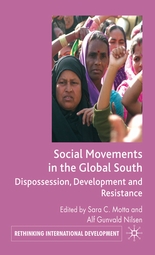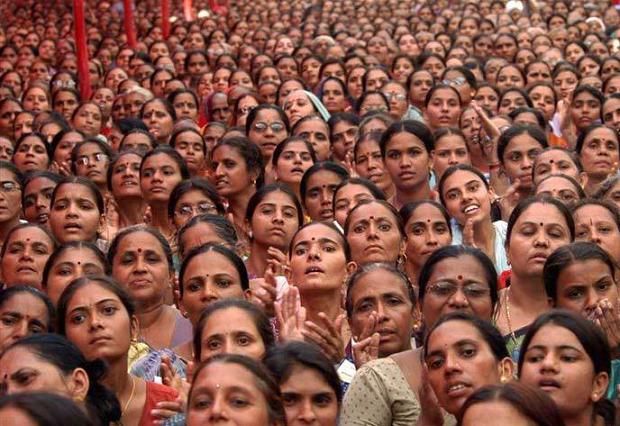Review: ‘Social Movements in the Global South’ Books
Books, New in Ceasefire - Posted on Monday, May 14, 2012 0:00 - 0 Comments
Members of the Swadhyaya Parivar, or self-awareness community, assemble at a “Women Self-Development Meet 2004” in Ahmadabad, India. (Source: cellar.com)
Global justice is a topic that has permeated the mainstream for many years; however, its current manifestation in the likes of Stop Kony 2012 or the selective support for regime change in the Middle East is clearly problematic through the manner in which it furthers the interests of the United States and its allies. But Motta, Nilson et al. take their analysis further, by focusing on grassroots social movements in the Global South, and their relationship with intellectuals.
Adopting the role of ‘activist scholar’, these academics often visit social movements for long periods of time, to not only research, write and analyse the politics of the movement, but to also contribute to its progress. The book draws strength from the wealth of experience the different contributors are able to offer.
The ‘pink tide’ of socialist movements in Latin America, revered by much of the left, is interrogated at the grass-roots level, giving the reader an insight into the everyday workings of organisers making exciting changes in Venezuela.
The book addresses fundamental questions such as why “exploitation and oppression sometimes demobilise, and at other times spark collective action” brings the theoretical analyses of Gramscian hegemony and counter-hegemony into the 21st century in a way that many modern theorists struggle to frame adequately.
Readers hoping for accounts of organising similar to the books by radical/anti-colonial activists such as Stokely Carmichael or Trevor Ngwane may find some sections a challenging read. Prior knowledge of theoretical concepts is sometimes assumed, making the book more of a highly engaging academic text, rather than a narrative of social movements for those less familiar with some of the related philosophical concepts.
Competing intellectual visions of anti-state and state-centric anti-capitalist revolutions offer compelling arguments on a theme that has often divided the radical left.
Nonetheless, an insight into organising in Egypt in the run-up to the mass uprising and the removal of Mubarak offers a far more robust description than the mainstream reports of crisis, disorder and online social media. Whereas much of the press portrayed discontent in the region centring on unemployment, the book recalls that “Politics and workers’ rights are inseparable. Work is politics by itself”.
The way in which the more formal state-centric campaigns around legal cases and citizens’ rights overlaps with struggles for autonomy and social upheaval is portrayed in an enlightening chapter on South Africa. The role of NGOs and the pitfalls of what are perceived as ‘single-issue’ campaigns are deconstructed in other important chapters.
The exploration of contradictions in academic research within social movements based in Africa, Asia or Latin America is one of the book’s greatest strengths. Notions of class or national privilege are of huge significance, and navigating these challenges is essential for the many development students who graduate every year.
Further questioning the usefulness of academic work in these social movements, and how to avoid neglecting the voice and agency of local activists, is probably the biggest question facing those interested in ‘activist scholarship’. Ensuring that the knowledge produced by the activist scholar is simply an addition to the different forms of knowledge contributing to the progression of a social movement is well communicated by a number of the contributors.
The idea that there is a hierarchy of knowledge is problematised, but often hard to reconcile, as it is rare (but not unheard of) for a movement’s activists to publish their own analysis.
Social Movements in the Global South is an important contribution to a critical discourse on international development, linking macro-economic and imperialist policies with the relationships between different actors in grass roots social movements.
 Although often presenting new questions rather than offering answers, the book enters the terrain of some of the most exciting movements for liberation across the globe, while honestly self-criticising the discipline used to communicate such important stories.
Although often presenting new questions rather than offering answers, the book enters the terrain of some of the most exciting movements for liberation across the globe, while honestly self-criticising the discipline used to communicate such important stories.
Social Movements in the Global South
Dispossession, Development and Resistance
Edited by Sara C. Motta and Alf Gunvald Nilsen
(Rethinking International Development series)
296 pages, Hardback.
Palgrave Macmillan (2011)



Leave a Reply